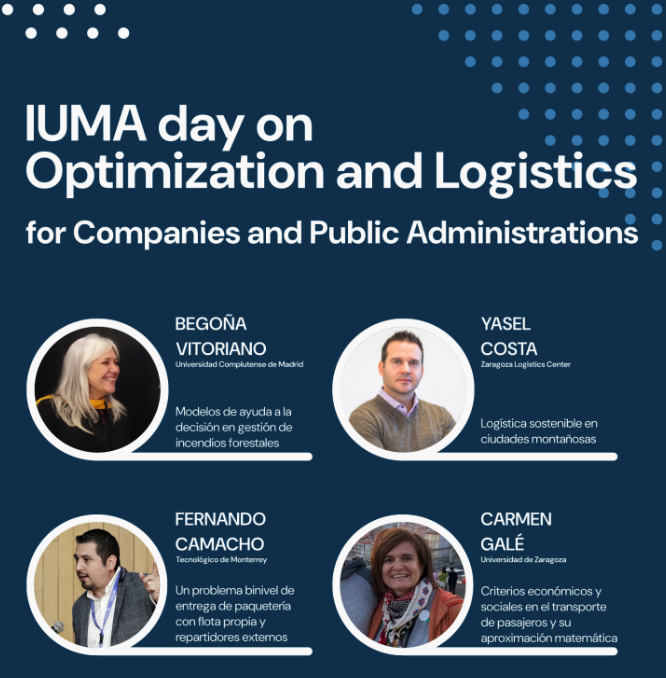Introduction: The Power of Bi-level Optimization in Logistics
In the world of modern logistics, where every second and every resource counts, José Fernando Camacho Vallejo stands out for his work under the bi-level optimization approach, which is transforming the way we conceive most logistics problems, particularly in transportation and delivery of goods.
Bi-level optimization, a complex field of operations research, addresses hierarchical decision problems where two entities, a leader and a follower, interact strategically. In the context of logistics, this translates into models that can revolutionize how companies plan their operations, from resource allocation to route planning.
Through his innovative research and presentations at international forums, Camacho is demonstrating how advanced mathematical theory can transform practice in the logistics and transportation sector. His recent trajectory, marked by three significant events, illustrates the profound impact his work is having in the field.
Continual Innovation: Collaboration in Seville
In May 2024, the historic buildings of Seville witnessed an encounter that is setting the course for modern logistics. Camacho initiated a week of intense collaboration with the multi-awarded Prof. Justo Puerto at the Institute of Mathematics of the University of Seville.
During his stay, Camacho presented a seminar titled "Bi-level Programming with Multiple Objectives for the Follower." This was no ordinary seminar. The audience was challenged to reconsider how high-level strategic decisions can shape and constrain operational options. Using practical examples from the logistics world, Camacho illustrated how bi-level optimization theory can solve real problems where efficiency and precision are crucial. For example, he showed how two competing companies in a market must decide which of their branches to close and the impact of making certain assumptions about the behavior of the lower-ranking company.
What made this approach unique was the consideration of multiple objectives for the follower. In the real world, companies seek not only to minimize costs but also to optimize delivery times, customer satisfaction, and other factors. Camacho's model allows for handling this complexity, offering mathematically correct solutions that are more realistic and applicable in practice.
From Research to Practice: ODYSSEUS 2024
Just a month later, in June 2024, the cobbled streets of Carmona, Spain, hosted researchers and logistics professionals from around the world for the prestigious ODYSSEUS 2024 conference. At this international venue, Camacho presented his work: "The Bi-level Vehicle Routing Problem with Private Fleet and External Drivers."
This study not only challenged the classic vehicle routing problem but also introduced a model that considers both a private fleet and external carriers within a bi-level optimization framework. The key innovation was the inclusion of penalties for missed deliveries, a critical issue for courier companies that subcontract part of their deliveries.
Camacho demonstrated how his model can optimize operations and reduce costs in real-world scenarios. For example, he illustrated how a courier company could decide which deliveries to assign to its private fleet and which to external drivers, considering factors like costs, capacity, and the possibility of failed deliveries.
Conference attendees were impressed by the immediate applicability of the model. Logistics companies could implement these solutions to improve operational efficiency, reduce costs, and increase customer satisfaction.
Inspiring the Future: IUMA Day in Zaragoza
A week later, in Zaragoza, Camacho continued his mission of linking mathematical theory with the practical needs of the industry. At the University Institute of Applied Mathematics (IUMA), he presented his lecture "A Bi-level Parcel Delivery Problem with Private Fleet and External Couriers" during IUMA Day.
In this presentation, he detailed how a Colombian courier company could optimize its operations using a combination of private fleet and external couriers. The research presented was the same as that exposed at ODYSSEUS 2024 but with a more diverse audience, including graduate students, academics, and industry collaborators. Given more time to delve into the topic, Camacho compared his novel approach with the traditional method of forcing couriers to complete all deliveries. He also showed how this new strategy could significantly improve operational efficiency. He presented preliminary results obtained through a heuristic algorithm and the acquisition of valid bounds, underscoring the practical applicability of his models in real situations.
IUMA Day attendees were impressed by how Camacho's model addressed a critical problem in the courier industry: managing undelivered parcels by external couriers. His approach not only offered an elegantly mathematical solution but also provided a practical tool for decision-making in the real world.

Global Impact: Transforming the Logistics Industry
Camacho's contributions are not limited to the academic realm. His models are revolutionizing how companies tackle logistical challenges in an increasingly complex and connected world.
Bi-level optimization, as applied by Camacho, offers a new perspective on how strategic and tactical decisions can be more effectively coordinated. His models help companies identify and mitigate risks associated with subcontracting and delivery variability, allowing them to improve resilience and adaptability.
Beyond logistics, Camacho's work has applications in a wide range of fields, from supply chain management to urban planning and resource allocation in public transport systems.
A Future of Innovation and Collaboration
José Fernando Camacho Vallejo's career is a testament to the importance of interdisciplinary research and international collaboration in seeking innovative and effective solutions to real-world challenges. From Seville, through Carmona, to Zaragoza, his contributions have left an indelible mark in the field of route optimization and logistics.
As the world continues to face complex challenges in logistics and transportation, Camacho's research provides a beacon of hope and a guide for future innovations.
With his commitment to excellence and focus on the practical application of mathematical theory, Camacho is a leader in his field. His work demonstrates that collaboration between academia and industry, along with constant innovation, is key to addressing current and future logistical challenges. As we move toward an increasingly interconnected world, these contributions will continue to be fundamental in shaping the future of modern logistics.